The intestine is part of the body system that digests food. The food we eat travels through our stomach, small intestine and large intestine. The intestines absorb nutrients and water from our food.
Cancer that starts in the large intestine is called intestinal cancer. Sometimes it is called colorectal cancer or colon cancer (named after the parts of the large intestine). Colorectal cancer is the second most common cancer for Nunavummiut. Lung cancer is the most common.
This type of cancer usually starts with a small growth in the intestine that causes no symptoms. This is called a "polyp". The polyp may grow bigger and cause symptoms like bleeding, weight loss, or change in bowel habits. Most polyps are found on screening tests done between 50 and 74 years old. As with other kinds of cancer, screening helps to find cancer when it is smaller. Finding cancer early will increase the chance that is has not spread to other parts of the body.
Things you can do to reduce your risk of colorectal or intestinal cancer:
- Following the Low-Risk Drinking Guidelines for alcohol
- Reduce or stop smoking. For help, talk to a health care provider, visit nuquits.ca or call the Nunavut Quitline at 1-866-368-7848.
- Maintaining a healthy weight
- Being active every day or most days
- Eating food rich in fibre, like whole grains, vegetables, berries and other fruits, nuts and seeds, and legumes (beans, peas and lentils).
- Getting screened with a stool (poop) test called a FIT test (fecal immunochemical test). It is recommended that people 50 to 74 years of age without symptoms get tested every two years. People with symptoms or a family history of this type of cancer may require different tests.
Talk to a health care provider or visit the Colorectal Cancer page on the Public Health Agency of Canada website to find out more about colorectal cancer or other types of cancer.



